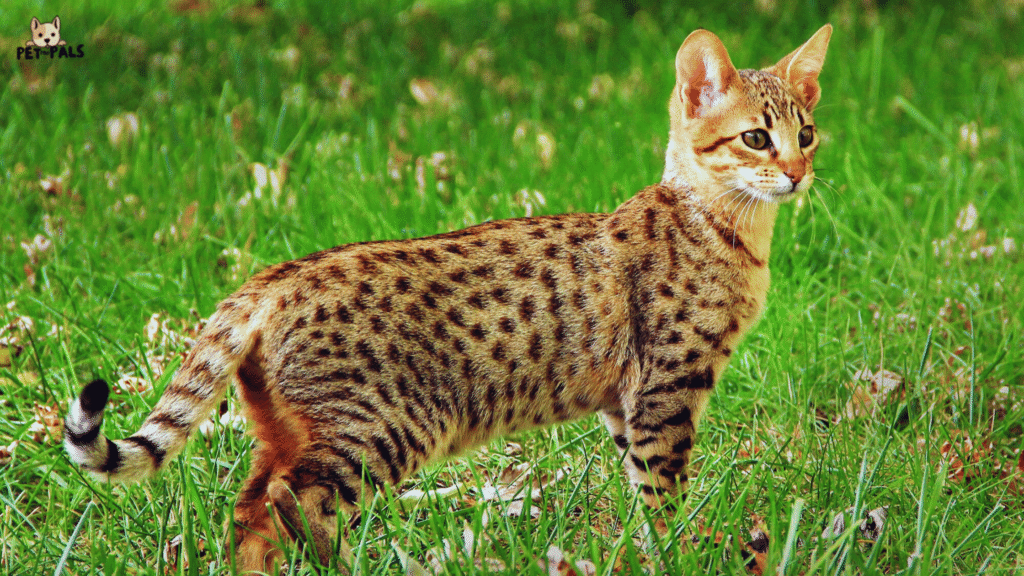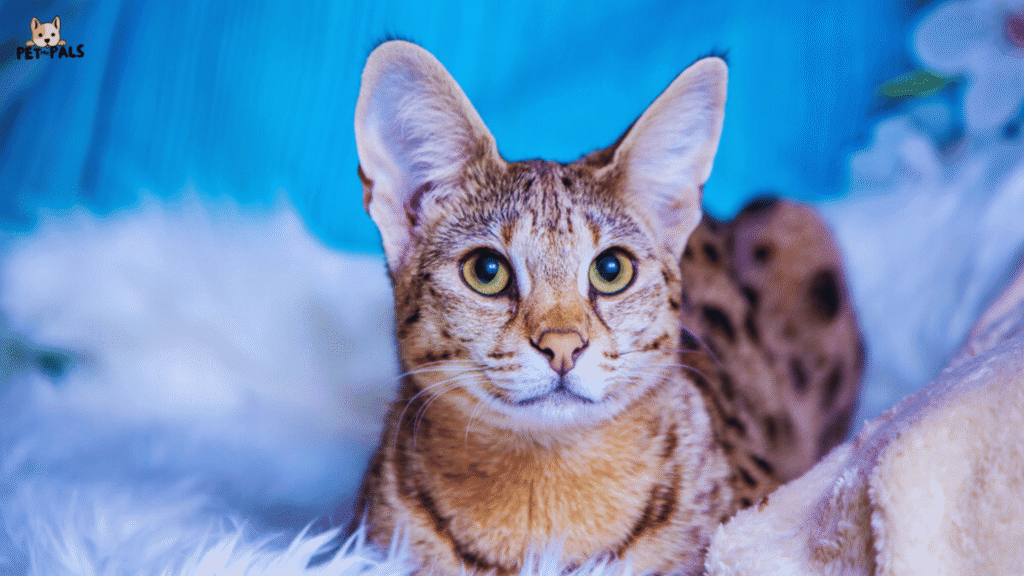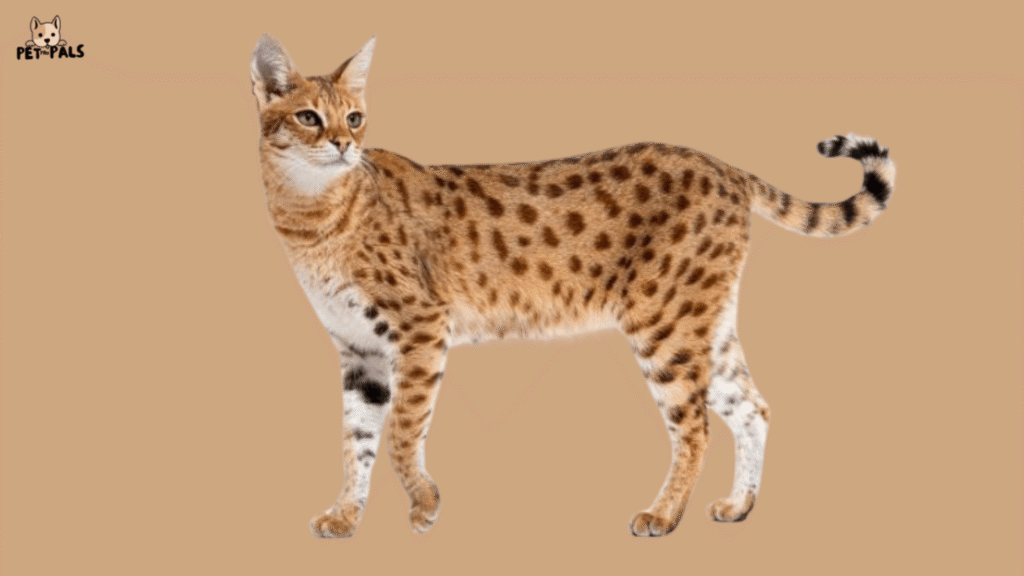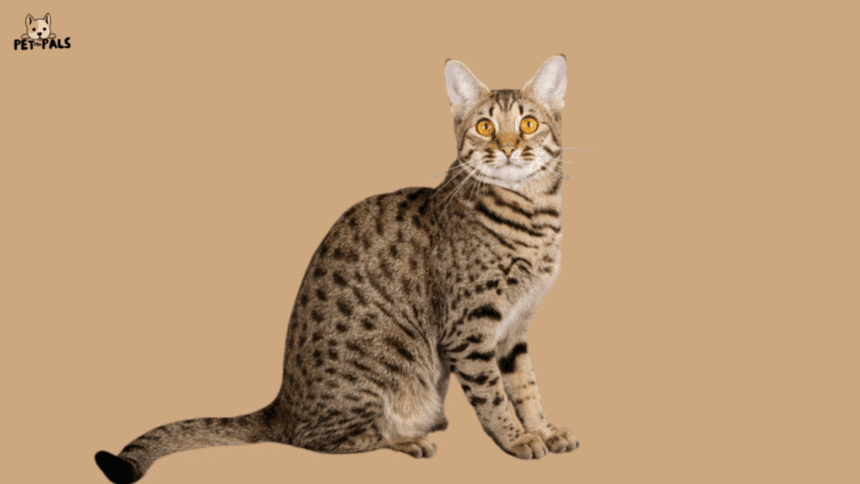The Savannah Cat is one of the largest and most striking domestic cat breeds out there. With its tall, slender build, oversized ears, and bold, spotted coat, it looks more like a wild predator than a house pet. This eye-catching appearance comes from its unique heritage.
Savannahs are a hybrid breed, born from a cross between a domestic cat and an African serval. The result? A feline that carries the mystery of the wild and the charm of a companion. It’s no surprise that wherever a Savannah Cat goes, it turns heads
‘But beyond their exotic looks lies a big question: what are Savannah Cats like to live with? Are they affectionate or aloof? High-maintenance or surprisingly chill? If you’re considering one, or just curious about the breed, you probably have a lot of questions about their personality, size, lifespan, behavior, and care needs.
In this guide, we’re diving into all the must-knows. You’ll learn about their legal status in different areas, what it costs to own one, how much time and space they need, and whether they’re suited for families or first-time cat parents. Let’s take the guesswork out of owning a Savannah Cat.
What Is a Savannah Cat?

The Savannah Cat is no ordinary house cat. This breed began with a bold experiment: crossing a domestic cat with a wild African serval. The result was a tall, athletic, and intelligent hybrid that carried the best of both worlds, wild looks with a (mostly) domestic temperament. The first documented Savannah Cat was born in the 1980s, and since then, breeders have carefully refined the lineage to create cats that are both exotic and manageable as pets.
Savannah Cat Traits: tall, spotted, athletic
Physically, Savannahs are known for their long legs, lean bodies, and large, upright ears perched high on their heads. Their coats are covered in bold, dark spots somewhat like a cheetah set against a golden, silver, or even smoky background. They’re incredibly athletic, capable of jumping up to eight feet high from a standstill, and they carry themselves with a confidence that often surprises people used to traditional house cats.
Savannah Cat Generations (F1 to F5)
One of the most important things to understand about Savannah Cats is their generational classification. These cats are labeled from F1 to F5, based on how close they are to their several ancestor. F1s have several parents, making them the wildest and largest in appearance and personality.
As you move down the generations to F2, F3, F4, and F5, each cat becomes more domesticated in behavior and size, making the later generations more suitable for everyday pet life. If you’re thinking about bringing a Savannah into your home, knowing the generation is key; it’ll tell you a lot about what kind of companion you’re signing up for.
Is a Savannah Cat Legal in the US?
Whether you can own a Savannah Cat in the U.S. depends on where you live. The legality of owning one varies from state to state, and sometimes even from city to city. While many states allow the ownership of Savannah Cats, others have strict regulations or outright bans, especially when it comes to the first generation (F1) hybrids, due to their wild ancestry.
Why legality is an issue (wild DNA)
The reason legality is such a big issue has to do with the Savannah’s several parentages. Since several are wild animals, their DNA carries certain traits that make these cats more unpredictable and challenging to care for. Some states have laws regulating the ownership of hybrid animals, particularly those that come from wild species.
This is to ensure the safety of both the animal and the public, as well as to prevent the potential spread of wild animal diseases. Even in states where it’s legal, there may be restrictions based on the generation of the Savannah Cat you own. For example, F1 and F2 cats may require special permits or be banned entirely, while F3 and later generations are more widely accepted.
How to check your state laws
To make sure you’re complying with local laws, it’s essential to check your state’s regulations before bringing home a Savannah. The best way to do this is by contacting your state’s wildlife or animal control agency, as they’ll have the most up-to-date information on any laws or permits required for hybrid cats. It’s always better to be informed and avoid any surprises down the road!
How Much Do Savannah Cats Cost?
The price of a Savannah Cat can vary dramatically depending on factors like their generation, pedigree, and breeder. In general, you can expect to pay anywhere from $1,000 to $20,000 for one of these stunning felines. The wide range is due to several factors, but the most significant is the generation of the cat.
Price by generation (F1 vs F5)
For example, F1 Savannah Cats, which have a serval as one of their parents, are the most expensive. These cats are rare and can cost anywhere from $10,000 to $20,000 or more. Their price reflects their wild heritage, rarity, and the complexities involved in breeding them.
As you move down the generations, the price typically drops. F5 Savannah Cats, which are five generations removed from the serval, are more domesticated and usually cost between $1,000 and $2,000. However, even F5 cats can be expensive, especially if they come from a well-established breeder or have an exceptional pedigree.
Other ownership costs: food, vet care, insurance
Beyond the initial cost of purchasing a Savannah, it’s important to factor in the ongoing expenses of ownership. These cats are active and athletic, so they require high-quality food to maintain their health and energy levels. Expect to spend $50–$100 per month on food, depending on the brand and quantity.
Regular vet visits, vaccinations, and health check-ups are also necessary, which can cost an additional $100–$300 annually. Additionally, because of their hybrid nature, some owners choose to invest in pet insurance, which can range from $30–$50 per month for coverage that helps offset medical costs. So, while owning a Savannah Cat can be an investment upfront, ongoing care is also an important consideration for any potential pet parent.
Are Savannah Cats Good House Pets?

When it comes to having a Savannah Cat as a house pet, the answer isn’t always straightforward. While they can make fantastic companions, they are best suited for owners who are prepared for an active, intelligent, and occasionally wild pet. Savannahs are known for their loyalty, intelligence, and high energy, which makes them engaging and fun, but also a challenge to keep entertained.
Do they bond with families?
These cats are highly interactive, often seeking out attention, play, and stimulation from their human family members. If you’re looking for a pet that will form a strong bond with you, a Savannah could be a great fit. They tend to bond closely with their families, and many owners report that their Savannahs are affectionate, even if they don’t always act like a traditional lap cat.
However, their wild ancestry means that they can have a bit of a rebellious streak. Savannah Cats often retain some of the serval’s independent and curious nature, meaning they may be more demanding in terms of attention and space than a typical domestic cat.
While they can be trained and will often respond well to positive reinforcement, they still retain their need for constant mental and physical stimulation. As a result, these cats thrive in households where they can interact regularly with their owners, and they may struggle with being left alone for long periods.
Apartment life vs open space
When it comes to living arrangements, Savannah Cats are best suited for homes with plenty of space. If you live in an apartment, it’s possible to keep a Savannah, but it will require extra attention to ensure they don’t get bored and destructive. You’ll need to provide them with enrichment like climbing structures, toys, and interactive playtime.
On the other hand, if you have a larger home with a secure outdoor space or a catio, they’ll thrive with the ability to roam and explore. Their love for jumping and climbing means they’ll enjoy a multi-level environment where they can get plenty of exercise.
Why Are Savannah Cats So Expensive?
The high cost of a Savannah Cat comes down to several key factors, starting with breeding difficulty. Pairing a domestic cat with a wild serval requires careful planning and specialized knowledge. Servals are wild animals, and breeding them with domesticated cats isn’t a straightforward process, often resulting in lower birth rates and higher costs for breeders. This makes Savannah Cats inherently more expensive than regular domestic cats.
Rarity and exotic appeal
Their rarity and exotic appeal contribute to the price. Savannahs are considered a luxury breed, attracting cat lovers who are drawn to their wild appearance and energetic personality. Their unique mix of domestic and wild traits makes them highly sought after, which drives up their cost.
Legal and transport fees
Legal and transport fees play a role. Depending on the location, breeders may face challenges with permits, transporting these cats across state lines, and complying with regulations on hybrid animals. All of these factors combined make Savannah Cats a significant investment.
Disadvantages of a Savannah Cat
While Savannah Cats are undoubtedly captivating and unique, they come with their own set of challenges that potential pet owners should be aware of. Legal complexity is one of the biggest hurdles. As discussed, owning a Savannah Cat is not legal in all states, and even where it is, you may need special permits, especially if you’re considering an F1 or F2 generation cat. Navigating the legal landscape can be tricky, so it’s important to thoroughly research the laws in your area before deciding to adopt one.
High energy and stimulation needs
Another disadvantage is their high energy and stimulation needs. These cats are incredibly active and require plenty of physical and mental exercise to stay happy. Without enough stimulation, they may become bored and destructive, leading to damage around your home. Their wild ancestry means they’re naturally inclined to jump, climb, and explore, so they need a space that supports their energetic lifestyle.
Difficult for first-time owners
Finally, Savannah Cats are difficult for first-time owners. While they are loyal and intelligent, their independent and sometimes wild nature can be challenging to manage for someone who has never owned an exotic breed. They require an experienced hand to provide consistent training, socialization, and care. If you’re not prepared for a pet that demands more attention and space than a typical cat, a Savannah may not be the best choice for you.
Do Savannah Cats Like to Be Picked Up?
Savannah Cats are known for their independent and active personalities, which means they don’t always enjoy being picked up or held, especially if it interferes with their freedom. While some Savannahs may tolerate being carried or cuddled, many prefer to keep their feet on the ground and avoid being restrained. Their wild serval heritage makes them more inclined to move and explore at their own pace, so being confined or held for long periods can make them uncomfortable.
That said, bonding with a Savannah is possible, but it requires patience and understanding. To build trust, focus on letting them come to you instead of forcing interaction. Offering treats, using toys to engage them, and letting them initiate contact will help foster a bond. Respecting their need for space and allowing them to choose when they want affection is key to forming a strong relationship with these unique cats.
Are Savannah Cats High Maintenance?

When it comes to maintenance, Savannah Cats fall somewhere between a regular domestic cat and a more exotic, high-maintenance animal. In terms of grooming, they are relatively low-maintenance. Their short coat requires minimal brushing, which means they don’t require much in the way of regular grooming.
Energy and enrichment needs (very high)
Their energy and enrichment needs are where things get demanding. Savannah Cats are incredibly active and require constant stimulation to stay happy. Their intelligence makes them quick learners, but it also means they can get easily bored, leading to potentially destructive behaviors if left to their own devices.
These cats need an outlet for their energy, think climbing structures, interactive play, and even puzzle feeders to challenge their minds. Without enough physical and mental engagement, they can become mischievous and start to tear things up in your home.
Smart, Easily Bored, Destructive if Ignored
Given their need for attention and activity, Savannah Cats are not ideal for owners who are frequently away from home or those without the time to provide the necessary stimulation. If you’re up for the challenge, however, you’ll find that they make incredibly loyal and engaging pets. But be prepared, keeping a Savannah happy means staying active alongside them.
Do Savannah Cats Shed a Lot?
Savannah Cats are moderate shedders, meaning they don’t shed as much as long-haired breeds, but they do shed regularly, especially during shedding season. Their short coat helps reduce the amount of hair that’s released compared to other cats, but it’s still something to consider when it comes to cleaning and maintenance. Regular brushing can help manage shedding, keep your home cleaner, and prevent hair from accumulating on your furniture or clothing.
Their coat type is sleek and dense, similar to their wild serval parent, which means they don’t require much in the way of grooming. A brushing session once a week should be enough to remove loose hairs and keep their coat healthy. If you have a Savannah, you’ll also want to keep up with their general hygiene, including nail trimming and ear cleaning, which are important for maintaining their overall well-being. If you’re sensitive to shedding, however, you might want to prepare for the occasional buildup of hair around your home.
Are Savannah Cats Hypoallergenic?
Although they may seem like the perfect hypoallergenic pet due to their sleek coat, Savannah Cats are not truly hypoallergenic. Like all cats, they produce dander, a protein found in their skin flakes and saliva, which can trigger allergic reactions in sensitive individuals. While some people find that they have fewer allergic reactions to certain breeds, Savannah Cats still produce the same allergens as other cats, so they aren’t a guaranteed solution for those with allergies.
If you or someone in your household is prone to allergies, it’s important to take precautions. Regular cleaning and frequent vacuuming can help keep dander levels down, and air purifiers may assist with reducing allergens in the home.
Bathing your Savannah may also help reduce the spread of allergens by removing some of the dander and saliva, although not all experts recommend frequent baths, as it can dry out their skin. If allergies are a major concern, it’s worth considering allergy shots or speaking with an allergist before bringing a Savannah into your home.
Here are your final sections, written with a clear, expert-like tone and engaging language:
Are Savannah Cats Lap Cats?
Savannah Cats are rarely lap cats. Their independent nature, combined with their energetic and curious personalities, makes them more inclined to explore, play, and walk around than sit still on your lap. While they are affectionate and can form strong bonds with their human family members, they prefer active interactions over cuddling and staying still. Instead of curling up on your lap, a Savannah is more likely to want to chase toys, climb, or jump to high places, where they feel more comfortable.
That said, some Savannah Cats may occasionally cuddle but only on their terms. If they’ve built a close bond with you and feel like it’s time for affection, they might settle beside you or on your lap for a short time. It’s important to remember that their need for space and freedom means they’re more focused on movement and exploration than passive relaxation. If you want a lap cat, a Savannah might not be the ideal choice, but if you’re up for a playful and engaging companion, they’ll keep you entertained in other ways.
What Type of Cat Does Justin Bieber Have?
Justin Bieber is known to have a F1 or F2 Savannah Cat, a rare and exotic breed that’s often associated with celebrity ownership. These early-generation Savannahs are known for their striking wild looks, and Justin’s cat has undoubtedly contributed to the breed’s growing popularity among fans and cat lovers alike. The celebrity influence has made the Savannah Cat more desirable to those who want a pet with a unique, wild appearance and personality.
However, the ethical debate around owning exotic pets, especially wild hybrids like the Savannah, has raised concerns. Critics argue that breeding and selling exotic hybrids can lead to welfare issues for the animals and pose challenges for owners. These cats require more space, time, and energy than typical domestic breeds, making them better suited for experienced pet owners who can meet their complex needs. Before acquiring such a cat, it’s essential to research both the breed and the ethical considerations involved in exotic pet ownership.
Final Thoughts
The Savannah Cat is undeniably fascinating, with its wild looks, high energy, and sometimes challenging temperament. Their exotic appearance and intelligence make them an appealing choice for the right owner, but they come with unique challenges. Their energetic nature, coupled with their legal complexity (especially if you’re considering an F1 or F2), means that they are best suited for experienced or active cat owners who are prepared for the responsibility of owning a high-maintenance, exotic pet.
If you’re considering a Savannah Cat, make sure to research breeders thoroughly and double-check the laws in your area regarding hybrid animals. Owning a Savannah Cat can be a rewarding experience, but it requires careful planning and commitment. With the right knowledge and preparation, you can enjoy the wild beauty and loyal companionship of one of the most unique cats out there.
FAQs About Savannah Cats
How long do Savannah Cats live?
Savannah Cats generally have a lifespan of around 12 to 20 years, depending on their health, care, and environment. Like many other cats, their longevity is influenced by factors such as diet, exercise, and regular veterinary check-ups.
Can Savannah Cats live with other pets?
Yes, Savannah Cats can live with other pets, but it depends on their personality and socialization. They tend to get along well with other cats and dogs, especially if introduced at a young age. However, their high energy and curiosity may sometimes make them a bit too bold for more passive pets.
Are Savannah Cats good with children?
Savannah Cats can be great with children, especially if they’ve been socialized properly. They are typically friendly, energetic, and enjoy interactive play. However, because they are active and may have a bit of a wild streak, it’s important to supervise interactions with young children to ensure both the cat and the child are safe.
How do you take care of a Savannah Cat?
Caring for a Savannah Cat requires providing them with plenty of stimulation, both mentally and physically. Regular playtime, climbing structures, and a safe outdoor area or catio are great ways to keep them active. You also need to ensure they receive a balanced diet and regular veterinary care. Grooming is minimal, but regular brushing is still helpful to manage shedding.
Can Savannah Cats be trained?
Yes, Savannah Cats are very intelligent and can be trained, but it may take patience and consistency. They respond well to positive reinforcement, such as treats or praise, and can learn tricks, commands, and even walk on a leash. However, due to their independence, they might not always follow commands the way more docile breeds do.
Do Savannah Cats require a lot of space?
Yes, Savannah Cats are active and need ample space to roam, jump, and explore. While they can live in apartments, it’s important to provide them with vertical climbing structures and plenty of enrichment activities. A large, secure outdoor area or catio is ideal for them to burn off energy.
Are Savannah Cats prone to health problems?
Generally, Savannah Cats are healthy and robust, but like all breeds, they can be prone to certain health issues. Some common concerns include hypertrophic cardiomyopathy (a heart condition) and hip dysplasia. Regular check-ups and a healthy lifestyle can help minimize these risks.

